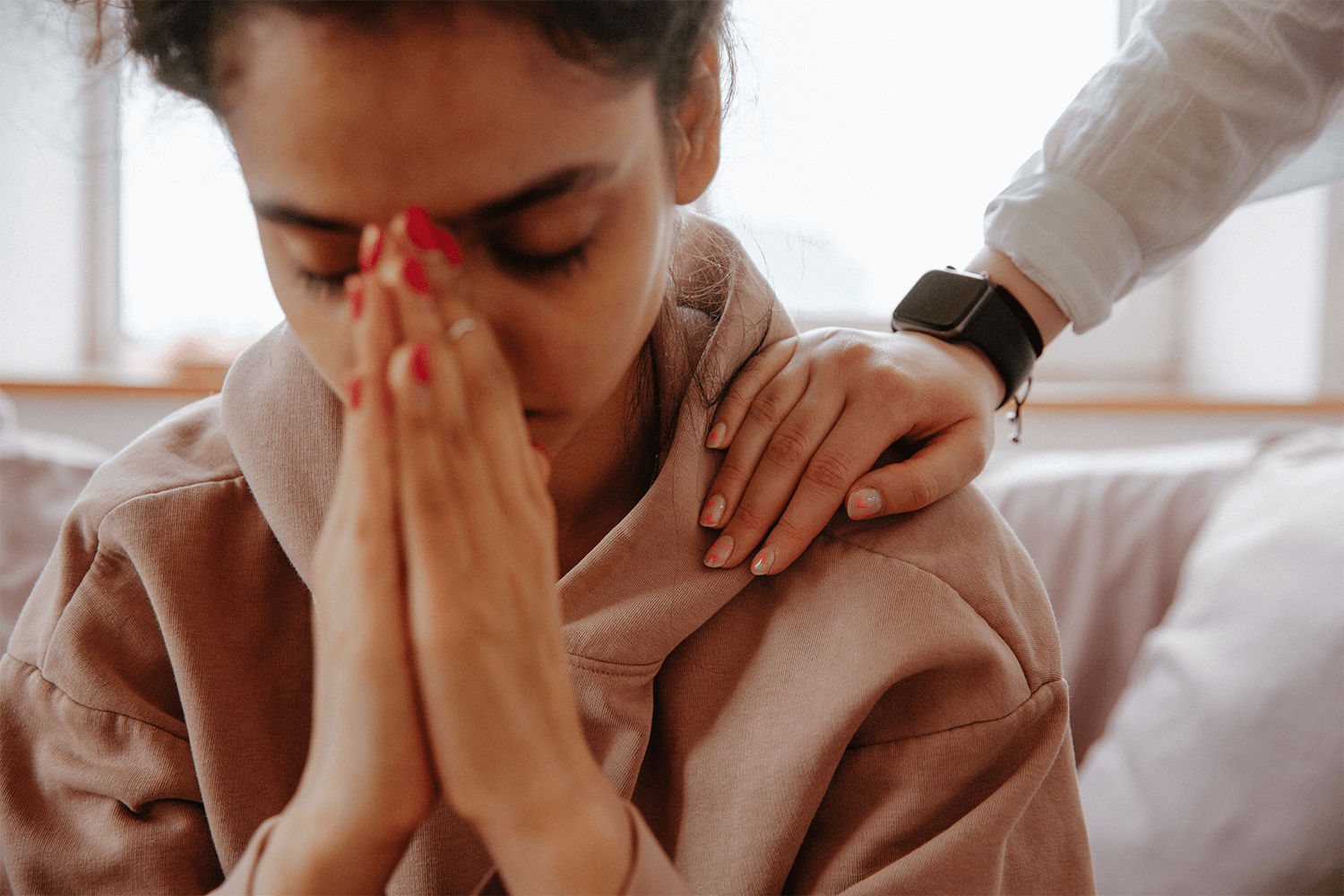Written by Ashley Kane,
Brightside Health
9 Minute Read

Medically reviewed by:
Conor O’Neill, PHD
Assoc. Director of Therapy
10 Minute Read

Depression is more than just feeling sad. It’s a complex mental health condition that affects how people think, feel, and function every day.
But what does depression feel like? Can you be depressed and happy? The answers aren’t simple because the experience varies from person to person.
What depression feels like can vary according to the individual. Still, there are common emotional, physical, and cognitive symptoms that many people share when they’re depressed.
Understanding these can help you or someone you care about recognize the signs and get the support needed.
How Do Depressed People Feel?
How does depression make you feel? People experiencing depression often describe a persistent heaviness or emptiness that colors everything. It can feel like:
- A fog that dulls emotions and thoughts.
- A weight pressing down on the chest.
- An absence of motivation or joy in things that once felt meaningful.
- Constant self-doubt and negative self-talk.
- A silent battle that others may not see.
If you’ve ever wondered, “How does depression feel?”, it often involves both emotional and physical discomfort—an all-encompassing sense that something is just not right.
What Does Depression Feel Like? Things Depressed People Commonly Experience
What is depression like for someone experiencing it? Although this can vary from person to person, there are certain shared common symptoms.
What does it feel like to be depressed? Can a depressed person be happy? Being depressed can feel like you’re drowning in slow motion—alive but numb, going through the motions without really living. Some people describe it as feeling disconnected from the world, or as if they’re watching life through a foggy window.
Let’s explore some of the most common signs and feelings that come with depression.
1. Persistent Sadness and Emptiness
What does being depressed feel like? One of the most defining symptoms of depression is a deep, unshakable sadness or emotional emptiness. It’s not just feeling down for a day—this feeling lingers for weeks or months, often without an obvious reason.
Examples:
- Feeling like crying but being unable to.
- Emotional numbness, where nothing seems to matter.
- Losing interest in activities you used to enjoy.
2. Fatigue and Low Energy
Depression can leave you feeling utterly exhausted, even after a full night’s sleep. Tasks that once felt simple may now feel impossible.
Examples:
- Struggling to get out of bed.
- Feeling physically heavy or drained throughout the day.
- Avoiding daily responsibilities due to a lack of energy.
3. Hopelessness and Negative Thoughts
Many people with depression find themselves stuck in a loop of negative thinking, feeling like things will never get better.
Examples:
- Thinking “What’s the point?” often.
- Feeling worthless or like a burden to others.
- Imagining a bleak or hopeless future.
4. Irritability and Mood Swings
While many associate depression with sadness, it can also show up as irritability or frustration, especially in men or teens.
Examples:
- Snapping at loved ones without meaning to.
- Getting overwhelmed by minor setbacks.
- Feeling ashamed of your own reactions.
5. Physical Symptoms
Depression doesn’t just affect your mind—it can take a real toll on your body, too.
Examples:
- Aches and pains with no clear cause.
- Changes in appetite or weight.
- Trouble sleeping or sleeping too much.
6. Thoughts of Death or Suicide
For some people, depression can lead to thoughts of death or suicide. These thoughts may range from passive wishes (like not wanting to wake up) to active planning. It’s a serious and urgent symptom that should never be ignored.
Examples:
- Thinking the world would be better off without you.
- Wishing you could disappear or stop existing.
- Having thoughts of self-harm or planning suicide.
If you or someone you know is struggling with these thoughts, it’s important to seek help immediately. You’re not alone, and there are people who care and want to help—like mental health professionals, crisis lines, or trusted friends and family:
- In the U.S.
- Immediate danger: Call 911 or go to your nearest emergency department.
- Suicide & Crisis Lifeline: Call or text 988 (24/7, free, confidential).
- Crisis Text Line: Text “HELLO” to 741741 to connect with a trained crisis counselor.
- Outside the U.S.
- Visit https://www.befrienders.org to find international crisis helplines in your country.
No matter how hopeless things might feel, support is within reach—and things can get better.
Can You Be Happy and Depressed?
Can you be happy with depression? It may sound contradictory, but depressed people can appear happy. This is sometimes referred to as “smiling depression.” On the outside, a person may seem fine—laughing, working, socializing—but internally, they’re battling deep emotional pain.
Additionally, some individuals, for example, those suffering from bipolar disorder, might experience a mixed state where they show symptoms of both depression and hypomania or mania. Or those dealing with atypical depression can have an elevated mood in response to positive events.
So, can people with depression be happy? Temporarily, yes. But those moments don’t erase the underlying struggle. That’s why it’s so important not to judge mental health based on appearances alone.
How to Snap Out of Depression?
There’s no quick fix for depression, and telling someone to “snap out of it” can actually be harmful. However, there are effective strategies and treatments that help manage and reduce symptoms over time:
- Therapy, especially cognitive behavioral therapy (CBT).
- Medication, such as antidepressants.
- Lifestyle changes, including regular exercise, nutrition, taking supplements for depression, and sleep.
- Social support from friends, family, or support groups.
Learn more about practical steps you can take in our guide on how to deal with depression.
Take the First Step Toward Feeling Better
If anything in this article sounds familiar, you’re not alone—and you’re not imagining it. Depression is real, and it’s treatable. You don’t need to “wait until it gets worse” or try to push through the pain by yourself.
At Brightside, we offer scientifically backed support that actually works. Whether you’re unsure if what you’re feeling is depression or already know you need help, taking the first step is simple.
Take our free, clinically validated depression test to understand your symptoms—and get a personalized care plan built for you.
It takes just a minute and could be the beginning of a healthier, brighter chapter in your life.
Want to speak 1:1 with an expert about your anxiety & depression?
How Depression Feels: Key Takeaways
Depression is a complex and deeply personal experience that can affect every aspect of a person’s life—emotionally, physically, and mentally. While it may feel isolating, it’s important to remember that you’re not alone and that what you’re going through is valid.
Can depressed people be happy? Recognizing the signs is the first step toward healing, and with the right support, things can get better. Whether you’re feeling numb, overwhelmed, exhausted, or just not yourself, reaching out for help can lead to real, lasting change.
If you’re wondering how to deal with depression, remember that you deserve support, and there is a path forward.
If You’re in Crisis, Help Is Available
If you’re experiencing thoughts of hurting yourself or ending your life, please know that you are not alone—and there is help. These feelings can be overwhelming, but support is just a call, text, or visit away:
- In the U.S.
- Immediate danger: Call 911 or go to your nearest emergency department.
- Suicide & Crisis Lifeline: Call or text 988 (24/7, free, confidential).
- Crisis Text Line: Text “HELLO” to 741741 to connect with a trained crisis counselor.
- Outside the U.S.
- Visit https://www.befrienders.org to find international crisis helplines in your country.
No matter how hopeless things might feel, support is within reach—and things can get better.
FAQs
What does depression feel like in your head?
It can feel like a foggy, heavy, and critical voice that follows you everywhere. Thoughts may be slow, distorted, or overwhelmingly negative.
What are the most common things depressed people do?
They might withdraw socially, sleep too much or too little, neglect responsibilities, or struggle with focus and motivation.
Is it ok to be depressed?
Yes. Depression is a common and treatable mental health condition. Feeling depressed doesn’t mean you’re weak—it means you’re human and need support.
Can depression make you feel like you’re going crazy?
Yes. The overwhelming thoughts and feelings can make you feel detached or irrational, but you’re not alone, and you’re not “crazy.”
Does depression come in waves?
Can depression come in waves? Absolutely. Many people experience periods of intense symptoms followed by temporary relief.
Is being depressed a choice?
No. Depression is not a choice or a moral failing. It’s a medical condition influenced by genetics, biology, environment, and life events.
What does a depressive episode feel like?
It’s like hitting a mental and emotional low where nothing feels possible or worth doing. You might feel overwhelmed, hopeless, or physically drained.
What does severe depression feel like?
Severe depression can feel paralyzing. People may struggle to get out of bed, care for themselves, or see any value in living.
What does major depression feel like?
Major depression involves a persistent depressed mood and loss of interest in activities, often accompanied by changes in sleep, appetite, and energy levels.
What does clinical depression feel like?
It includes emotional and physical symptoms that significantly impact daily life, such as sadness, guilt, fatigue, and difficulty concentrating.
What does chronic depression feel like?
Chronic depression, or dysthymia, feels like a dull, ongoing sadness or lack of joy that persists for two years or more.
What does depression feel like physically?
It can cause fatigue, headaches, body aches, and digestive issues. You may feel physically heavy or tense without a clear reason.
Why am I depressed when my life is good?
Depression doesn’t always need a “reason.” Brain chemistry, genetics, or past trauma can contribute, even if life seems fine externally.
What is it like to live with a depressed person?
It can be emotionally challenging. They may withdraw, act irritably, or seem indifferent. Patience, compassion, and support are essential.














